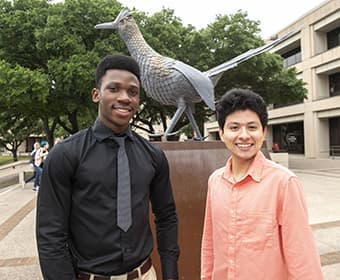Posted on May 9, 2019 by Rebeca Gomez

For the first time in UTSA history, two students have been awarded the distinguished Barry M. Goldwater Scholarship in the same year. Honors College students Favour Obuseh, a sophomore biomedical engineering major, and Aldo Sepulveda, a junior majoring in physics, are the third and fourth Roadrunners ever to receive the honor.
The scholarship is widely considered the nation's most prestigious honor for undergraduate math and science students. Of the 1,223 natural science, engineering and mathematics sophomores and juniors nominated this year, just 496 students received the scholarship.
“I was astonished by the announcement and also grateful for all the help that I received in completing the application,” said Obuseh.
Growing up in Nigeria, Obuseh says the idea of utilizing research to solve problems was foreign to him.
“I grew up believing that people who got sick with malaria suffered imminent death, that amputees would never walk, and that children born with congenital defects would suffer forever,” said Obuseh.
His perception changed after moving to Houston when he was 13 years old. He said he learned anything is possible.
After high school, Obuseh chose to attend UTSA to pursue biomedical engineering so he could help people who may not lead a ‘normal life’ due to physical impairment. Now, as a sophomore, he conducts research on prevascularization of scaffolds with Eric Brey, chair of the UTSA Department of Biomedical Engineering. They’re working to provide a means for bone tissue regeneration by preparing already established blood vessel networks in a scaffold.
“The Goldwater scholarship is a step in the right direction for my goal of obtaining a Ph.D. in biomedical engineering, which will provide the platform I need to increase the diversity in the research field as a principal investigator,” said Obuseh. “The scholarship will also help me to focus on what I love most—learning and research.”
Sepulveda, UTSA’s other 2019 Goldwater Scholar, is a first-generation student from San Antonio. When he arrived at UTSA, he hadn’t yet established a clear career goal. Then he took an academic inquiry and scholarship class that he says changed his life forever.
“I learned about research and academia in a meaningful way and immediately became interested in it as a career,” said Sepulveda.
He chose to major in physics and conducted research on extrasolar planetary systems through summer research internships at UT-Austin and Harvard.
“I would not be on the trajectory that I am now without my outstanding mentors, trusted allies and benevolent support network at large,” Sepulveda said.
The Goldwater scholarship will allow him to better compete for a position as a Ph.D. student in graduate school.
"This scholarship reflects the substantial professional and personal growth I've achieved in my college experience,” said Sepulveda. “It is one of many stepping stones for my long-term goal of becoming a successful research astronomer."
After he graduates from UTSA in 2020, Sepulveda plans to continue his research and pursue a Ph.D. and eventually influence other college students as a research professor.
As UTSA’s Goldwater campus representative, Craig Jordan, UTSA College of Sciences associate dean of academic programs, nominated Obuseh and Sepulveda for the award.
“Receiving two in one year is a first for UTSA,” said Jordan. “It is additional recognition that we provide outstanding research opportunities for our students and that they are can be among the best trained and most competitive in the nation as they pursue their post-UTSA interests.”
The Goldwater Scholarship is a living memorial for Senator Barry Goldwater and awards scholarships in the amount of $7,500. Established by Congress in 1986, the scholarship was created to foster young talent in the areas of natural science, engineering and mathematics.
This article was originally published in UTSA Today. You can access the original article via this link
